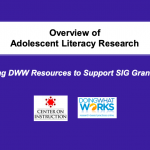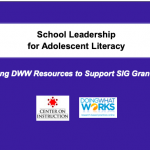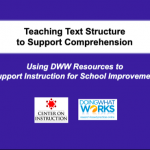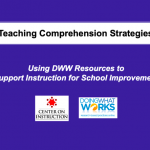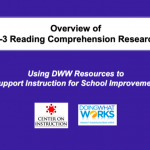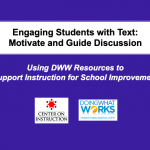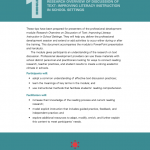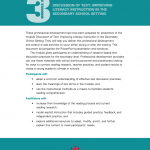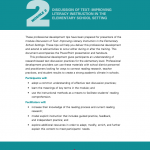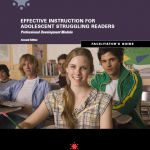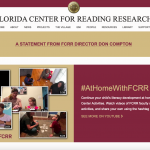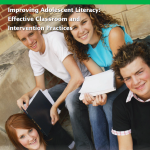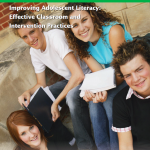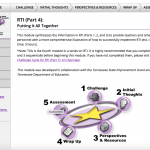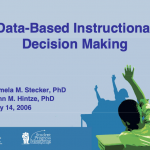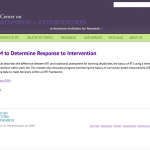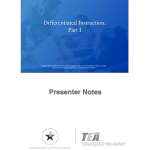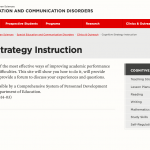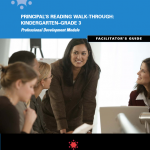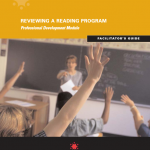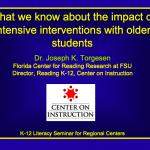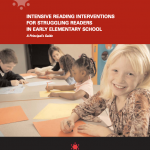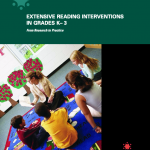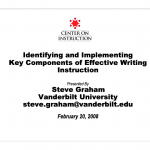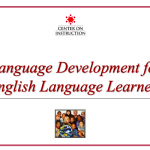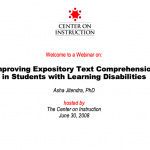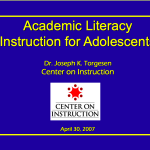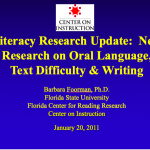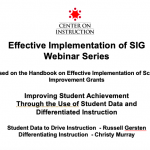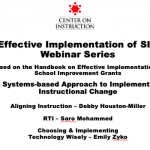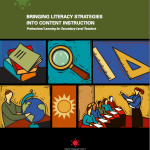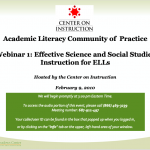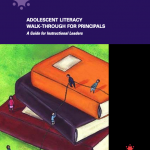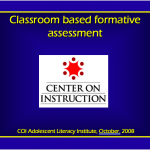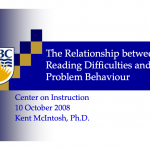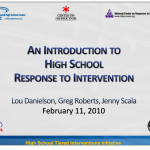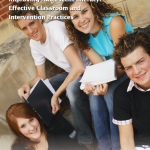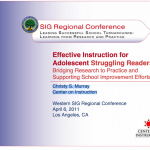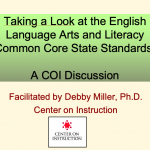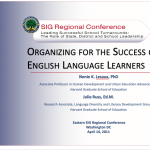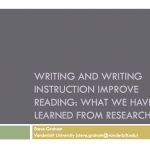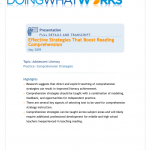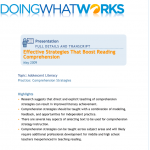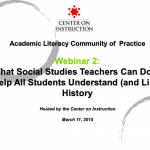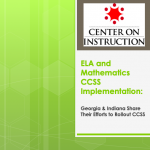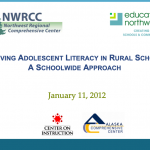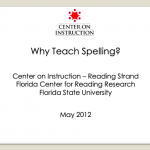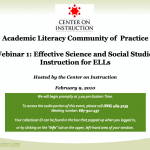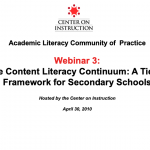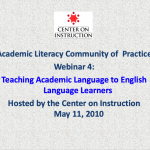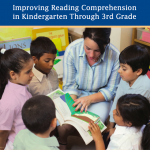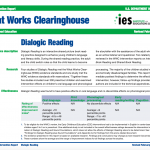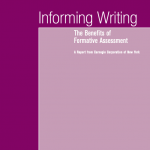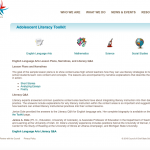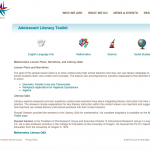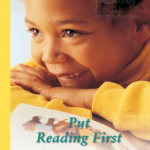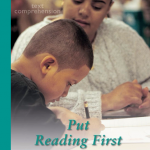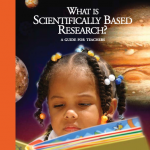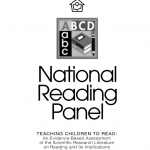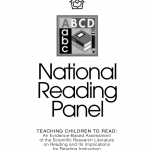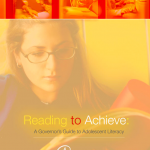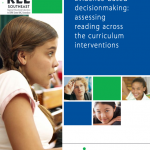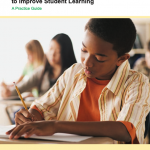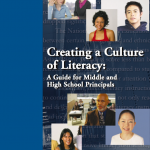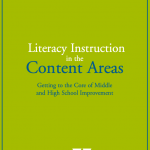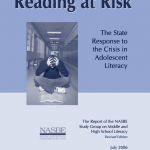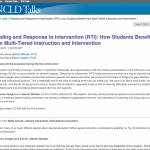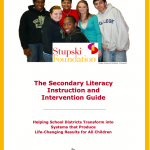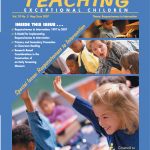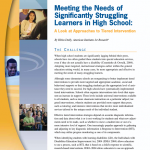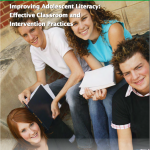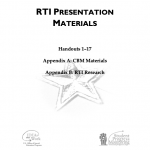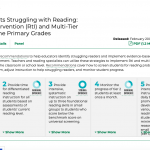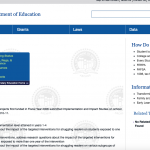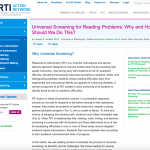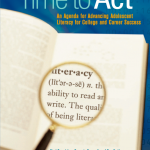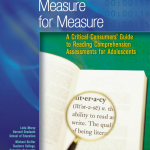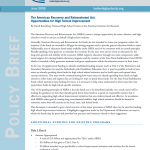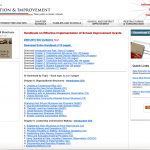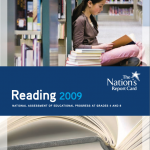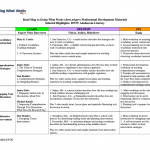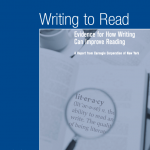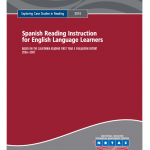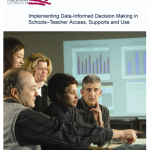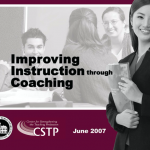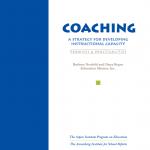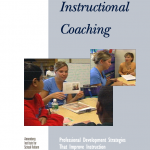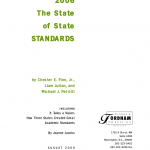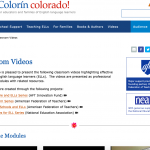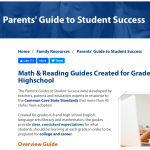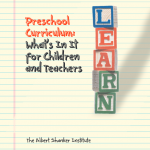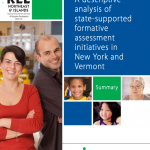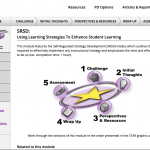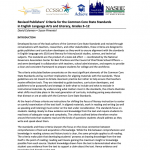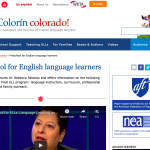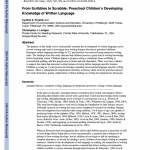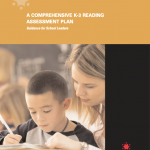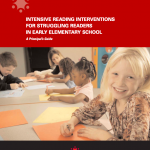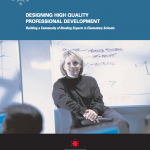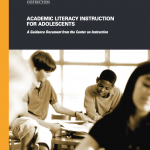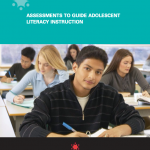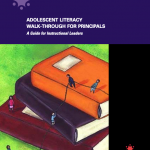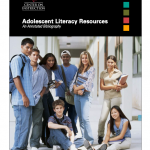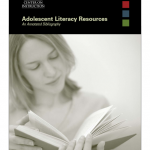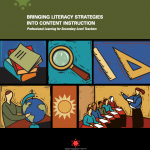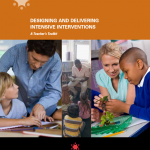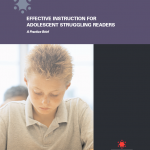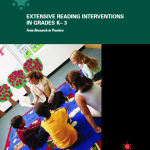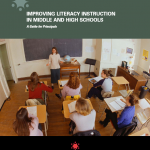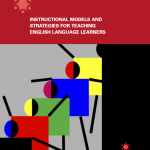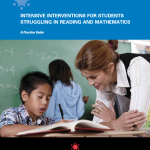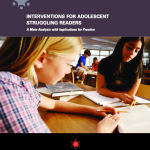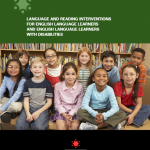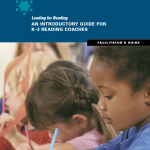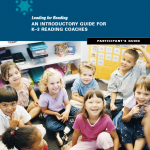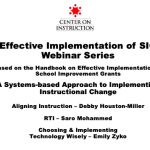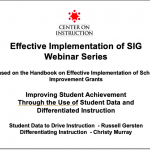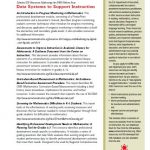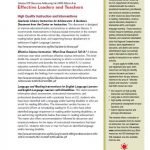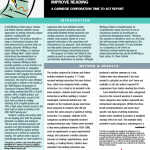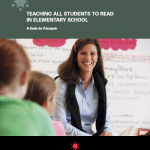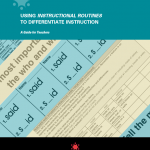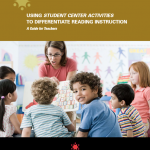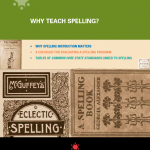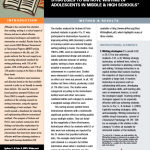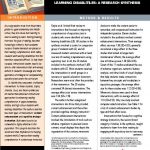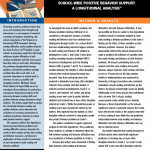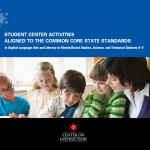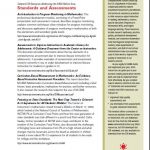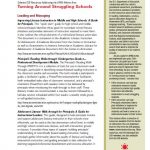
RMC Research offers materials and resources on Literacy and English Language Arts that help educators improve academic outcomes for students, address the problem of struggling readers, and meet instructional challenges of diversity in students’ ability and readiness in learning to read.
Organization Levels
Content Areas
Grade Levels
Topic Areas
ESSA Evidence Tier
This Research Overview module is the second in a series of five webinar modules designed to provide key adolescent literacy principles and practices to support the federally funded School Improvement Grants (SIG).
This School Leadership module is the first in a series of five webinar modules designed to provide key adolescent literacy principles and practices to support the federally funded School Improvement Grants (SIG).
This Teaching Text Structure to Support Comprehension module is the fourth in a series of four Improving K-3 Reading Comprehension webinars designed to provide key principles and practices that support classroom instruction.
This Teaching Comprehension Strategies module is the second in a series of four Improving K-3 Reading Comprehension webinars designed to provide key principles and practices that support classroom instruction.
This Research Overview module is the first in a series of four Improving K-3 Reading Comprehension webinars designed to provide key principles and practices that support classroom instruction.
This Engaging Students with Text module is the third in a series of four Improving K-3 Reading Comprehension webinars designed to provide key principles and practices that support classroom instruction.
This is the first module in a series of three designed to provide key principles and practices that support classroom instruction.
This is the third module in a series of three designed to provide key principles and practices that support classroom instruction.
This is the second module in a series of three designed to provide key principles and practices that support classroom instruction.
This suite of resource materials is designed to prepare school-based reading coaches who work with teachers to improve reading instruction in kindergarten through grade three.
This suite of resources is designed to guide the delivery of instruction for adolescent struggling readers as well as deepen technical assistance providers' knowledge and enrich their work with SEAs and LEAs.
The Florida Center for Reading Research conducts applied research that will have an immediate impact on policy and practices related to literacy instruction and assessment in Florida; disseminates information about research-based practices related to literacy instruction and assessment for children in pre-school through 12th grade; and conducts basic research on reading, reading growth, reading assessment, and reading instruction that will contribute to the scientific knowledge of reading.
This Text Discussion module is the fourth in a series of five webinar modules designed to provide key adolescent literacy principles and practices to support the federally funded School Improvement Grants (SIG).
This Explicit Vocabulary Instruction in Middle and High School module is the third in a series of five webinar modules designed to provide key adolescent literacy principles and practices to support the federally funded School Improvement Grants (SIG).
This online module is the fourth of a series providing information on Response to Intervention.
This PowerPoint presentation is intended for teachers who are currently implementing CBM in reading and/or math and administrators who are supporting CBM implementation.
This series of modules provides information about how student progress monitoring, specifically Curriculum Based Measurement (CBM), can be used to determine a student's response to an intervention.
This packet of materials provides presenter notes as well as participant handouts for a training for teachers as they implement differentiated instruction in the classroom.
This resource reviews the use of cognitive strategy instruction as a way to improve academic performance for children with learning difficulties.
This is a suite of professional development materials designed as a user-friendly tool for classroom walk-through implementation that can identify research-based reading instruction in the classroom quickly.
The Center on Instruction has developed a two-day professional development module based on the Florida Center for Reading Research's "Guidelines for Reviewing a Reading Program."
On February 14 and 15, 2006, the Center on Instruction hosted a two-day workshop for Regional Comprehensive Centers staff on the topic K-12 literacy.
On May 10, 2006, Dr. Joseph Torgesen presented a Webcast of "A Principal's Guide to Intensive Reading Interventions for Struggling Readers in Elementary Schools."
The Center on Instruction hosted a WebEx on October 24, 2007, to provide an opportunity for authors Dr. Sharon Vaughn and Dr. Jeanne Wanzek to present findings from the Extensive Interventions in Grades K-3: From Research to Practice report and to discuss the implications on reading-related issues for primary-grade students at risk for reading difficulties and learning disabilities.
The Center on Instruction hosted a WebEx on February 20, 2008, focused on writing as a critical aspect of literacy and one in which effective instructional techniques and models for intervention are needed.
The Center on Instruction hosted a training-of-trainers workshop May 29-30, 2008, in Houston, Texas to provide Regional Comprehensive Center staff and state personnel with current research and instructional strategies related to language development and reading interventions for ELLs with and without disabilities.
The Center on Instruction hosted a WebEx on June 30, 2008, focused on a soon-to-be-released synopsis of a research synthesis, "Improving Comprehension of Expository Text in Students With LD".
In a video conference held April 30, 2007, Dr. Joseph Torgesen of COI's Reading Strand provided an overview of the newly released "Academic Literacy Instruction for Adolescents: A Guidance Document from the Center on Instruction."
The Center on Instruction hosted a webinar January 20, 2011, in which Dr. Barbara Foorman of the Florida Center for Reading Research (FCRR) provided an overview of recent research in oral language, text difficulty, and writing, and the implications the findings from the research have for improving reading outcomes.
This webinar is the second in a series of School Improvement Grants (SIG) webinars designed to provide key principles, action steps, and useful resources that support the initial Action Planning steps identified in the Handbook on Effective Implementation of School Improvement Grants, which was developed by the five regional content centers.
This webinar is the first in a series of School Improvement Grants (SIG) webinars designed to provide key principles, action steps, and useful resources that support the initial Action Planning Steps identified in the SIG Handbook.
The Center on Instruction provided an interactive webinar on July 22, 2010, to introduce the newly released Bringing Literacy Strategies into Content Instruction.
The Academic Literacy Community of Practice webinar series provided Regional Comprehensive Center staff an opportunity to engage in an interactive learning process with Center on Instruction staff centered on adolescent literacy best practices used in traditional content-area classrooms in grades 4-12, including differentiated instruction for students with language needs, struggling students, and students with disabilities, and methods for disseminating useful information and resources to SEAs to enhance state-level literacy professional development.
The Center on Instruction provided an orientation to the recently released Adolescent Literacy Walk-through for Principals: A Guide for Instructional Leaders - Grades 4-12 on August 10, 2009.
The Center on Instruction hosted an Adolescent Literacy Institute October 15-17, 2008, in New Orleans, to encourage deeper understanding and effective use of two adolescent literacy products.
The Center on Instruction hosted a WebEx on October 10, 2008, focused on the prevention of reading difficulties and/or problem behavior.
The High School Tiered Interventions Initiative (HSTII), a collaborative effort among the Center on Instruction, the National Center on Response to Intervention, and the National High School Center, conducted a series of webinars around RTI.
This Intensive Interventions for Struggling Readers module is the fifth in a series of five webinar modules designed to provide key adolescent literacy principles and practices to support the federally funded School Improvement Grants (SIG).
The Center on Instruction was a co-sponsor of the four national School Improvement Grants (SIG) conferences held in April and May 2011.
This webinar provides an overview and an opportunity to explore and learn more about the Common Core State Standards as they relate to English Language Arts and Literacy from kindergarten to college- and career-readiness.
The Center on Instruction is a co-sponsor of the four regional School Improvement Grants (SIG) conferences held in April and May 2011.
The Center on Instruction hosted a webinar on April 21, 2011, featuring Dr. Steve Graham, co-author of "Writing to Read", a meta-analysis that examines the influence of writing on reading skills.
The Center on Instruction is a co-sponsor of the four regional School Improvement Grants (SIG) conferences being held in April and May 2011.
The Center on Instruction is a co-sponsor of the four regional School Improvement Grants (SIG) conferences held in April and May 2011.
This webinar was the second of a series of webinars designed to provide an opportunity engage with national experts in an interactive learning process centered on adolescent literacy best practices used in traditional content-area classrooms in grades 4-12.
This Center on Instruction webinar on June 26, 2012, featured Pam Smith, Director of Academic Standards and Instruction with the Georgia Department of Education, and Zach Fougherty, Director of College and Career Readiness for the Indiana Department of Education, who shared their successes and challenges in rolling out the Common Core State Standards in their states.
Debby Houston Miller and Vicki LaRock of the Center on Instruction presented "Improving Adolescent Literacy in Rural Schools: A Schoolwide Approach" at a January 11, 2012, webinar co-sponsored with the Northwest Regional Comprehensive Center and the Alaska Comprehensive Center.
Deborah K. Reed, author of the Center on Instruction publication Why Teach Spelling? provided the answer to this question in a May 10, 2012 webinar with a brief review of the research about the impact of spelling on reading abilities, spelling development, and approaches to spelling instruction.
This webinar was the first of a series of 90-minute sessions designed to provide an opportunity to engage in an interactive learning process centered on adolescent literacy best practices used in traditional content-area classrooms in grades 4-12.
This webinar was the third of a series of webinars designed to provide an opportunity to engage with national experts in an interactive learning process centered on adolescent literacy best practices used in traditional content-area classrooms in grades 4-12.
This webinar was the fourth of a series of webinars designed to provide an opportunity to engage with national experts in an interactive learning process centered on adolescent literacy best practices used in traditional content-area classrooms in grades 4-12.
This guide presents a set of evidence-based practices that teachers and other educators can use to successfully teach reading comprehension to young readers.
Dialogic Reading is an interactive shared picture book reading experience designed to enhance young children's language and literacy skills.
This report examines the effectiveness of formative writing assessment and answers two questions: (1) does formative assessment enhance student writing, and (2) how can teachers improve formative writing assessments in the classroom.
This Content Area Literacy Guide, one component of CCSSOs Adolescent Literacy Toolkit, explains the importance of content literacy and provides examples of instructional strategies and best practices that support all students as they progress from the learning-to-read focus of elementary school to the reading-to-learn focus of high school core content classes.
As one component of CCSSOs Adolescent Literacy Toolkit, this Math Q & A by Dr. Russell Gersten on the topic of content literacy for mathematics is designed to help teachers understand the value of integrating literacy best practices and instructional strategies into content-area instruction.
This is the Spanish version of a 5 page translation of "Put Reading First: Helping Your Child Learn to Read - A Parent Guide."
This is a 64-page booklet summarizing the findings of the National Reading Panel Report for teachers of kindergarten through third grade students.
This 5-page brochure discusses the basics on how to help your child become a reader -- what to look for at school and do at home in 25 easy-to-follow tips.
This 8-page brochure is a condensed version of Using Research and Reason in Education whic outlines the basic guidelines in evaluating educational research and using the scientific method in the classroom.
This 35-page report explains the origin of the Panel and its congressional charge.
This comprehensive report explains the methodology and scientific research used by the National Reading Panel (NRP) in its effort to assess the best ways to teach children to read.
This document provides a description of the work of the Advisory Panel of the National Governors Association Center for Best Practices.
This 67 page report describes an investigation of adolescent literacy initiatives in seven states, analysis of a sample of interventions to improve literacy outcomes and guidance for matching interventions to specific school needs.
This practice guide offers teachers ways to improve their instruction and their students' study habits to enhance learning and remembering information.
This report describes research-based practices that can be used to create a secondary school literacy instructional plan. It also includes descriptions of schools that have implemented the practices.
This report describes issues that must be addressed as students move beyond achieving basic reading fluency, vocabulary, and comprehension skills to more advanced literacy skills that will enable them to succeed in academic content areas.
This document, the final report of a year-long study of adolescent literacy conducted by the National Association of State Boards of Education, outlines recommendations for policymakers based on joint problem-solving, collaborative practice, and collective accountability that engages students in purposeful reading and writing in all subjects being taught.
[pdf-embedder url="https://resources.rmcwebapp.com/wp-content/uploads/securepdfs/2020/06/Reading_At_Risk_Full_Report-1.pdf" title="Reading_At_Risk_Full_Report"]
In this transcript of an April 2007 Q&A session, Drs. Sharon Vaughn and Jeanne Wanzek discuss features of RTI and offer information about its implementation.
This guide provides a replicable district-level model of instruction to meet the differentiated needs of struggling adolescents.
The Council for Exceptional Children's May/June 2007 issue provides a cogent framework for understanding RTI as a means of preventing academic failure and identifying students as having learning disabilities.
This brief describes issues related to the implementation of RTI at the high school level.
This practice guide offers five evidence-based recommendations for educators to use to improve literacy levels among adolescents in upper elementary, middle, and high schools.
This resource provides clear distinctions between services offered in the different tiers of RTI and addresses both reading and math.
The What Works Clearinghouse (WWC) has released a practice guide to help educators identify struggling readers and implement evidence-based strategies to increase academic achievement.
The Striving Readers program aims to improve the reading skills of middle and high school-aged students reading below grade level.
This resource provides an in-depth introduction to early screening of all students to identify those at risk for academic and/or behavior difficulties.
This report describes the research base and data on how to help students "read to learn."
This guide draws together evidence on nine of the most commonly used, commercially available reading comprehension assessments for use with adolescents.
This guidance document discusses some of the challenges for adolescents who struggle with written texts in the academic subject: areas of history, science, mathematics, and literacy.
This policy brief offers an overview of the major provisions of ARRA that may be used for funding high school improvement initiatives.
This handbook bolsters effective implementation of intervention models and strategies outlined in the 2009 SIG program in order to achieve the programs clear goal rapid improvement of persistently low-achieving schools.
This report presents results of the 2009 National Assessment of Educational Progress (NAEP) in reading at grades 4 and 8.
Doing What Works is a website dedicated to assisting teachers in the implementation of effective educational practices, including teaching literacy to ELLs.
This report presents results of a meta-analysis that examines the influence of writing on reading skills.
[pdf-embedder url="https://resources.rmcwebapp.com/wp-content/uploads/securepdfs/2020/06/ccny_report_2010_writing.pdf"]
This document highlights a case study that compares two approaches for teaching ELLs to read: (1) in their primary language (Spanish) and then transitioning to English, and (2) in English only.
[pdf-embedder url="https://resources.rmcwebapp.com/wp-content/uploads/securepdfs/2020/06/Spanish-Reading-Instruction-for-ELLs.pdf" title="Spanish Reading Instruction for ELLs"]
This document presents an analysis of district and school use of data systems to improve instruction, which can be used to provide guidance for the implementation of data-informed decision-making.
This resource provides an overview of the role instructional coaches play in improving educational outcomes, with an emphasis on content development and instructional strategies.
This paper describes coaching, the role of coaches, support of coaches, and the potential benefits of using a coaching model of professional development.
This resource describes professional development instructional coaching strategies. Its research-based guidance is intended for teachers and teacher leaders, as well as school and district administrators.
This report from the Fordham Institute compares ELA and Math standards of each of the 50 states and the District of Columbia to the Common Core Standards.
Colorin Colorado's Watch & Learn, funded by the American Federation of Teachers, presents four video modules featuring strategies from secondary ELL classrooms and interviews with experts on ELL best practices.
This resource was developed in response to the Common Core State Standards (CCSS) in English language arts and mathematics.
This publication provides an evidence-based overview of four dimensions of preschool curriculum: oral language, literacy, mathematics, and science.
This study examined two formative assessment initiatives that used a consensus definition of formative assessment endorsed by CCSSO.
This resource promotes the use of strategy-based instruction through an interactive module on utilizing different learning strategies with struggling students, including Self-regulated Strategy Development (SRSD).
These two guides (K-2 and Grades 3-12) provide guidance to curriculum providers as they modify current literacy resources or create new resources for improving student outcomes in literacy that align with the English Language Arts section of the CCSS.
This resource is the second part of a webcast featuring Dr. Rebecca Palacios, a national expert in early childhood curriculum and instruction for young English Language learners.
This document discusses a research study focused on the emergent writing skills of young children. Investigators Cynthia Puranik and Christopher Lonigan found evidence to support the developmental progression of emergent writing skills.
This guide provides valuable information for school leaders as they develop a comprehensive assessment plan as a critical element for preventing reading difficulties.
This guide provides information critical to developing and implementing an effective school-level intervention program.
This brief provides guidelines for building a high-quality professional development program to support reading instruction in elementary schools.
This document makes recommendations for improving academic literacy instruction for students in grades 4-12 in content areas or across the school day, including students reading below grade level and ELL students.
This guide provides information about the key elements of a comprehensive assessment plan to improve literacy instruction for adolescents.
This guide and accompanying scenarios of adolescent literacy instruction, designed to help principals monitor and support adolescent literacy instruction in their schools more effectively, can be used at the late elementary school level, in content-area classes in middle and high school, and with intervention groups or classes.
This annotated bibliography, updated from a 2007 edition, is intended as a resource for technical assistance providers as they work with states on adolescent literacy.
This array of research summaries and policy documents on reading and reading comprehension for students in grades 4-12 includes discussions of all the current important research issues in adolescent literacy.
This document provides research-based guidance on academic literacy instruction in the content areas, specifically focusing on the effective use of text in content areas.
This document is based on an analysis that determined the sub-skills students need to achieve in each of the Foundational Skills (K–5) in the Common Core State Standards (CCSS).
This toolkit provides activities and resources to assist practitioners in designing and delivering intensive interventions in reading and mathematics for K–12 students with significant learning difficulties and disabilities.
This practice brief focuses on the five reading components: word study, fluency, vocabulary, comprehension, and motivation.
This report summarizes 12 peer-reviewed, high-quality research studies between 1995 and 2005 and synthesizes their findings on the effects of extension reading interventions (comprising at least 100 instructional sessions) for struggling K-3 readers.
This "quick start" guide for secondary school principals outlines critical elements of a school-level literacy action plan.
Module 1 is one of two presentations on informational text structure, focusing on students in Grades K-5; Module 2 addresses students in Grades 6-12 and is posted separately.
Module 2 is one of two presentations on informational text structure, focusing on students in Grades 6-12; Module 1 addresses students in Grades K-5 and is posted separately.
This publication offers educators and policy-makers guidance on research-based strategies that have been effective in instructing English Language learners.
This publication provides research-based guidance that reflects "best practices" for intensifying instruction in reading and mathematics for students with significant learning difficulties in K-12, including students with disabilities.
Results of this meta-analysis provide guidance for intervening with adolescent struggling readers, outlining major implications for practice.
This report presents information about assessment, instructional interventions, and professional development with a particular focus on ELL students who have been identified with a language and/or learning disability.
For ease in downloading, the Guide has been separated into chapter files. To download each chapter, click below.
For ease in downloading, the Guide has been separated into chapter files. To download each chapter, click below.
***This resource has been archived and is no longer available ***
This FREE self-paced online course is a series of four modules based on the guide Bringing Literacy Strategies into Content Instruction: Professional Learning for Secondary-Level Teachers.
This FREE self-paced online course is a series of four modules based on the practice guide Intensive Interventions for Students Struggling in Reading and Mathematics.
These three documents provide the references and resources identified in the first of the series of COI School Improvement Grants (SIG) webinars on Effective Implementation of School Improvement Grants (SIG).
These documents provide the references and resources identified in the second of the series of COI School Improvement Grants (SIG) webinars on Effective Implementation of School Improvement Grants (SIG).
COI's resources can help implement reforms for data systems to support instruction.
COI's resources help to identify reforms that work and how to implement them.
This synopsis of Graham and Hebert's meta-analysis presents an overview of their findings and describes implications for practice.
This "quick start" guide for elementary school-level instructional leaders is based on scientific research on reading and reading instruction as well as on studies of successful schools and interviews with successful principals.
This publication helps educators plan differentiated instruction using 72 formatted activities called Instructional Routines, which provide a structure for teaching specific foundational reading skills.
This guide describes a suite of Student Center Activities offering teachers a wide range of activities to engage students in differentiated reading activities during small-group work in the classroom.
In this video conference Dr. Joseph Torgesen provides an overview of the newly released "Adolescent Literacy Instruction for Adolescents".
This resource is a compilation of three documents that support the teaching of spelling in today’s schools: a discussion of “Why Spelling Instruction Matters�, a checklist for evaluating a spelling program, and tables of Common Core State Standards that are linked to spelling instruction.
This synopsis distills the findings reported in "Writing Next", with special attention to findings for students with learning disabilities.
This synopsis of "Improving Comprehension of Expository Text in Students With LD: A Research Synthesis" discusses the results of a synthesis of 29 studies that addressed instructional approaches for enhancing reading comprehension
To investigate the ways in which academic and behavior problems develop, McIntosh, Homer, Card, Boland, and Good (2006) conducted a retrospective longitudinal analysis of the interaction between reading skills and problem behavior among students from kindergarten through Grade 5 in a school district that was implementing universal support systems for both reading and behavior.
This publication helps educators create differentiated reading instruction experiences for their students by showing the relationship between two distinct resources: Student Center Activities (SCAs), created by the Florida Center for Reading Research for K–5 classroom teachers as differentiated reading activities for use in small student groups, and the Common Core State Standards (CCSS).
COI's resources can help implement high quality assessments and use information from assessments to guide classroom instruction.
COI's resources can help implement reforms for lowest performing schools.

